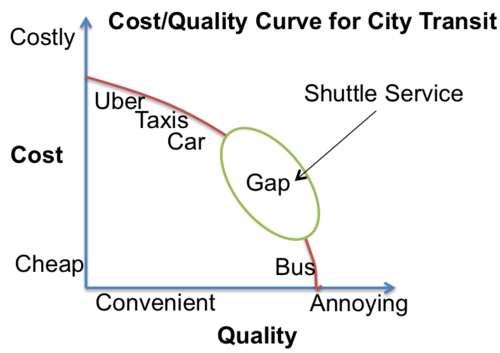Thought Experiment: Uber meets Super Shuttle
Earlier this week, Hamish McKenzie had an interesting article on a future without cars. The article lays out a great vision but lacks near term solutions. Here's one which could go a ways in eliminating the need for cars.

The Vision
A service which marries the ease and convenience of Uber with the low cost of Super Shuttle. You would be able to call a shuttle through an iPhone app and it will show up at your location in minutes. The shuttle will then whisk you to your destination with only a few slight detours along the way (to drop off other passengers). While slightly slower than grabbing a cab, it would be much more affordable.
The Assumptions
Demand
Many people own cars because they lack access to an affordable substitute. Public transportion may not be near nor run often enough. Taxis may be too expensive to use as frequently as necessary. The success of Zipcar may indicate that people will forgo car ownership if decent alternatives exist.
While not as convenient as a taxi, these shuttles are much more convenient than busses as they will take you directly to your destination and will arrive on demand. People will accept delays to pick up others, so long as the price is right and the delays are minors.
Here is a look at the possible Cost / Quality curve:

This service could cannibalize:
- Taxi users who care more about cost than speed
- Bus users who care more about convenience than cost
- Car owners who can't afford taxis regularly but need more convenience than busses
Costs & Revenues
The economic viability depends on asset utilization which would be driven by customer density. In other words, there needs to be enough users to keep the shuttles reasonably full without making major detours.
Compared with taxis, the costs related to gas should be only modestly higher and the driver's wages about the same. The cost/hour/vehicle will only be slightly higher than taxis yet be spread across many passengers. This would allow the service to charge dramatically less than taxis.
I haven't run the numbers but I suspect the charge to the user would be much closer to public transit than taxi usage. This low cost, combined with the convenience factor, might be a tempting enough for people to give up their cars.
Technical Ability
A key element to the success is efficient routing. If users enter their end destination when they call the shuttle (from the app), an algorithm should be able to route the shuttles to users in a way that minimizes overall delay experienced by any given user.
I don't think the algorithm would be that difficult to build but it's success would be dependent on an active enough user base to effectively optimize. If users are too spread out, either the delays will be too long or average number of passengers too low.
Potential Considerations
Because this hinges on density, the service would need to grow quickly to reach an efficient scale. A city by city rollout, accompanied by a marketing blitz, is most likely to achieve success. If the minimum efficient scale is high enough - some cities may only support one firm, resulting in a natural monopoly.
It is less clear whether such a system would work in the suburbs as they may lack the density to reach efficiency. It may be the case that it works only if 75% of a town's residents use the service instead of a car.
Partnerships could exist which could lower costs. For example, a grocery store may offer to pay half a user's fare if the shuttle brings them to the store. An San Francisco grocer already offers free rides home - an indication that this model could work.
Final Thoughts
I really like this idea and think it could work; I'd definitely use it! It's not something I'd build myself - I lack the authenticity and passion to see it through - but I hope someone builds it. Uber may be the best candidate, as they start seeking new customer segments.
Do you think it would work? Would you use it? Let me know in the comments...